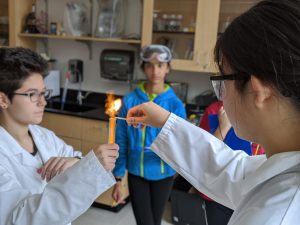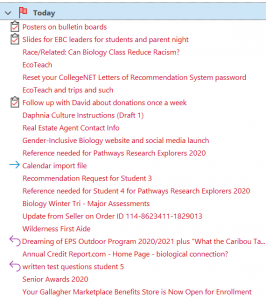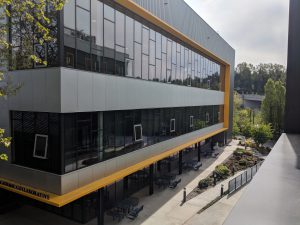(1) approaches recommendations for improvement receptively and responsively
(2) displays openness and comfort with visitors observing class
(3) seeks out diverse opinions of others for guidance
(4) manages and prioritizes professional tasks and responsibilities
(5) communicates and responds to students, parents, and colleagues in a timely and constructive manner

(6) approaches recommendations for improvement receptively and responsively
I actively seek recommendations for improvement in my class. In addition to the regular reviews that the school asks students to fill out, I frequently ask students for verbal feedback during lessons as well as request written feedback periodically during reflection assignments for class. I try to close the loop on this feedback by sharing openly with students the changes that I make as a result of their feedback as well as explaining which aspects of class are a direct result of past feedback from students. Overall, the goal is for all students to have a method of communicating feedback to me that they are comfortable with. If you’re not receptive to feedback and adjustments along the way, then the end result often looks quite different than what you intended.
(7) displays openness and comfort with visitors observing class

Visitors in class include tours from admissions, students from other classes working on labs, teachers interviewing for positions at EPS, current teachers observing class for their own development or to give me feedback on something specific, official visits from administrators or others. I welcome anyone to visit my classes at any point in time. If there is a specific topic or activity you want to see you should check in with me in advance, but that is not a requirement as long as you’re conscious about minimizing interruption of the class flow as you enter and exit.
(8) seeks out diverse opinions of others for guidance
Outside perspective is crucial to avoid building an overlapping mess and sometimes you realize that what you’ve built needs to be torn down. In my day-to-day navigation of school I seek opinions in the following ways

- Breakfast conversations every morning. Generally, the same group of people, but topics and conversations are very spontaneous
- Lunch Conversations – try to sit near person I don’t know or haven’t talked to in awhile
- PDP meetings/happy hour/faculty meetings – look for group that has mix of people I haven’t been with before.
- Seeking people from other departments to identify integration and overlap points
- Previous and next class in the sequence
- Counselors to identify trends of issues the cohort would benefit from learning about
- Coaches and Advisors to find out about
- Student surveys to identify their interests, goals, stresses and perspective on class
- Safety Third – just because it makes you think. I’ve been saying this for years and finally found someone who agrees.
(9) manages and prioritizes professional tasks and responsibilities
It’s a never ending task to stay on top of this I currently use Outlook for most of this.
Unless I’m very behind and under a deadline (in which case I find a remote corner to hide and turn off notifications) all of the tasks can be interrupted if a student or faculty member asks for help. Relationships always come first.
To do list kept in Outlook following the concepts in the Urgent important Matrix to help make sure I’m spending time on things that will make a difference in the long run.
Urgent things that come up along the way go on stickies/paper and must be accomplished or transferred by the end of the day.
(10) Communicates and responds to students, parents, and colleagues in a timely and constructive manner

If you really listen to the feeback from others and complete the communication loop it is amazing what can be built.
For timely, I have the following rules.
- Respond within 24 hours – Email, Canvas comment on assignment
- Respond within 48 hours –
- Respond within 1 week
- Add to future to do list –
For Constructive manner, my natural tendency is to try to solve problems and plan for efficient solutions. This can come across as insensitive and dismissive depending on who I’m communicating with. As an attempt to improve my effectiveness at connecting with others to make our communication constructive I have actively been working to broaden my perspective and experiences. Outlined below are some of the things I have done.
- Joined Equity and Inclusion Club
- Specifically tried to connect with old classmates and relatives on Social Media that I know have different perspectives from my own
- Seeking connections within my neighborhood of people with different experiences and perspectives than my own
- When I travel I look for an opportunity to learn about the other persons stories
- Continue working to improve my Spanish
- Relevant Books I’ve Read
Braiding Sweetgrass – Robin Wall Kimmerer – Native American Perspective on Botany
Sapiens – Yuval Noah Harari – Unique perspective on the development of western culture
Man’s Search for Meaning – Viktor E Frankl – Reflection from experience in concentration camp
Kindred – Octavia Butler distopian literature outling potential consequences of not planning ahead
Born a Crime – Trevor Noah – Perspective of growing up during Apartheid in South Africa
Race Matters – Cornel West – Classic treatise on essays on the issues relevant to black Americans
Feminist Fight Club – Jessica Bennett – provided me insight into the way sexism can be subtly found everywhere
The New Jim Crow – Michael Alexander – Racism was never dead in America, it just keeps being repackaged
Tears We Cannot Stop – Michael Eric Dyson – a sermon to white America
Thoughts for the future

I’m never satisfied with the current system I have, it’s always being tinkered with and adjusted — sometimes small, sometimes a complete tear down. In my mind there’s a beautiful end product that I’m working towards. But society keeps changing, and what students need is ever shifting. Sometimes dull gray stone can take on some amazing color with the right lighting. In reality there’s always something to work on and some way to improve. Below are some ideas that may change before you even read this.
(1) approaches recommendations for improvement receptively and responsively
Internally I am very open and receptive to feedback, but I am also a very deep thinker and will often feel like I should explain all my thinking to make sure everyone understands what I was trying to accomplish. At times, this can come across as being defensive and note receptive to feedback. In the future I need to be careful to not limit feedback by sounding defensive.
(2) displays openness and comfort with visitors observing class
When groups visit class for tours I would like to figure out a way to more naturally engage with them while not limiting the learning that is occurring during class. This could potentially be accomplished at least partially by developing some posters for the walls that are a good reminder for students, but an also serve to inform visitors of the main themes and structure of the class.
(3) seeks out diverse opinions of others for guidance
I think I’m on a good trajectory here. I want to continue reading and looking for opportunities to connect with others from different perspectives. The more I do this, the more I get from it and the more I enjoy the interactions. I do want to continue working on my Spanish skills and look for ways to authentically bring that into my family life at home.
(4) manages and prioritizes professional tasks and responsibilities
Continue working to eliminate unnecessary tasks and streamline the things that can be automated to make more room for the deeper and more impactful interactions and experiences.
Slow down and appreciate the here and now.
(5) communicates and responds to students, parents, and colleagues in a timely and constructive manner
I would like to identify 3-4 key touch points to connect with parents of my classes to help keep them more informed about the big picture goals for classes and give them resources and tools they can access to be supportive and involved with their kids (if they want to).